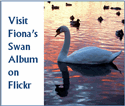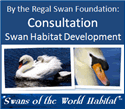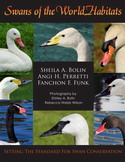Ask the Swan Specialist
Date: 26 March 2009
Hi Sharon:
Some folks swear by the use of swans to eliminate geese, while others have very little success. Most sites with geese problems use the Mute Swans. The Black Swans are the most aggressive swan species, but like any animal, it depends how they are raised and the individual swan personality. However, since they are aggressive, how are people, especially with children and pets going to respond to being chased by the swans? Are there natural predators in your area, i.e., bobcat, fox, domestic dogs and cats? These predators and of course man can seriously injure or kill a swan.
We have several captive habitats which we consult that have both geese and swans. The swans do not chase the geese and in fact, usually it is the goose that is more aggressive.
Before selecting a swan species and gender, you must look at your state laws concerning importation, possession and breeding. If you get a breeding pair of swans, you will need to pinion the cygnets at 1-3 weeks of age, which means you will need to capture the birds and get them to a veterinarian, have the procedure conducted and get them back to the parents within a reasonable time, 2-3 hours. All of these issues may require a state license/permit from your local Fish & Game Commission. If the geese are listed as migratory protected waterfowl in your state, you may not be able to harrass, move or do anything to the geese. Check with your wildlife officials before doing anything.
Also, black swans produce a clutch of eggs two times a year, which means you will possibly have at least 1-20 new cygnets each year. A mute swan pair will have only one clutch of eggs and may produce between 1-13 cygnets a year. Once the swans are juveniles, the parents will chase them from the pond and you will need to find a new home for them. Do you have a contingency plan for the cygnets?
Do you have an adequate area for penning the birds before they are released onto the lake (this may take up to 2 weeks). If you do not pen the swans on the lake and introduce them to their habitat and where they are being fed, they may wander or die from starvation.
Do you have an adequate area for nesting for the swans during breeding season? Who is going to be responsible for the daily upkeep of the swans, their annual veterinary medical visits as well as any emergency veterinary medical care that they may need, who is going to be responsible for feeding the swans (they must be supplementally fed) and the feed can run about $1,000-$2,000 a year? Who will be responsible for the food and veterinary bills?
All of these questions must be asked before purchasing any swans. It is not fair to the birds to have them neglected, injured or killed when bringing them to a new habitat. Swans are a daily upkeep in captive settings and many state laws rule them as exotics meaning you do have to provide humane daily maintenance and veterinary medical care.
Lastly, if the swan chasing of the geese does not work, then you may find yourself with a pond overrun by geese and swans.
If you have answered all of the above questions with the birds' welfare in mind and the community is aggreeable to take a chance with the swans, then contact Knox Swans out of Chicago and they can provide you purchase information. The Regal Swan
Messages In This Thread
- Black Swans -- Sharon Bury -- 25 March 2009
- Bringing swans to a new habitat: What is involved -- The Regal Swan -- 26 March 2009
Ask the Swan Specialist is powered by
Tetra-WebBBS 5.30 Beta © 2006-2007 Tetra-Team






